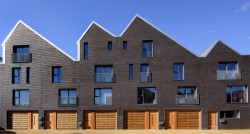When Chris Thompson, Managing Director of sustainable urban developers, Citu, realised that outdated construction methods would hold back his ambition to accelerate the transition to low carbon cities, he set out to revolutionise the way in which homes are designed and built in the UK.
This spring, work began on the construction of the first low carbon homes at our Climate Innovation District in Leeds’s South Bank. This marked a major milestone, not only for the scheme itself – which will be the largest ecologically pioneering district of this scale in the UK – but also for Citu and our ambition to build zero carbon neighbourhoods that provide healthier, smarter and better connected cities.
The district marks the next chapter in Citu’s story, which began back in 2004 when I founded the business. With my background in construction and a passion for urban design, I wanted Citu to be a company which challenges industry norms and embraces innovation and new technology. This meant addressing the key issue which has led to the construction industry falling behind other sectors in terms of innovation and productivity – and that’s inefficiency. The issue is two-fold: there’s inefficiency in terms of the quality of the product which causes heat loss and emissions from the houses themselves. But there is also inefficiency in terms of the construction process, caused by delays in transporting materials to site and poor communication between multiple contractors.
Our first project, Greenhouse, involved the renovation of a former hostel in Beeston, close to Leeds city centre – creating a mixed-use building of 177 apartments, office spaces and leisure spaces. The scheme, one of the few developments in Leeds to goahead during the recession, offers a whole range of eco-friendly elements including wind turbines, solar panels, ground source heating and rainwater harvesting to reduce energy and water use.
The success of Greenhouse (which is fully let) gave us the confidence to up-scale our ambition. Our next project, Little Kelham in Sheffield, is a development of 250 low-carbon apartments and family homes alongside repurposed listed buildings and commercial spaces. At first, we used a contractor to deliver the homes, but we quickly realised that traditional construction methods couldn’t achieve the high standards we’d set both in terms of efficiency and energy performance. We’d need to develop a model which integrates the entire supply chain so that we could control every element of the design and construction in-house.
To do this, we had to look outside the construction industry for inspiration.
I learned a lot from looking at companies like Tesla and Apple in terms of how they embrace innovation and control every element in the manufacture of their product. We’re now harnessing the best talent from a range of sectors, from digital coders and architects to universities and automotive experts, and repurposing their skills to change the way homes are built.
To finish reading this article please visit: Offsite Magazine









